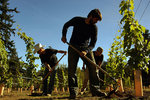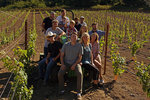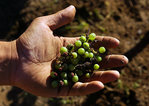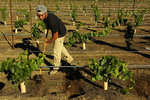Orderly rows of grapevines marching across the hillsides in Port Townsend's Happy Valley represent the beginnings of a long-term local enterprise: the Port Townsend Vineyards.
Good things take …
This item is available in full to subscribers.
We have recently launched a new and improved website. To continue reading, you will need to either log into your subscriber account, or purchase a new subscription.
If you had an active account on our previous website, then you have an account here. Simply reset your password to regain access to your account.
If you did not have an account on our previous website, but are a current print subscriber, click here to set up your website account.
Otherwise, click here to view your options for subscribing.
* Having trouble? Call our circulation department at 360-385-2900, or email our support.
Please log in to continue |
|




Orderly rows of grapevines marching across the hillsides in Port Townsend's Happy Valley represent the beginnings of a long-term local enterprise: the Port Townsend Vineyards.
Good things take time, and wine is no exception.
Jens and Karle Coppenrath and their vineyard team started planting vines eight months ago. Ten different varieties of wine grapes have been planted on just over six acres – about 800 to 1,000 plants per acre. It takes about three years for the vines to come to fruition, about the same amount of time it takes to be certified organic, which is "the only way to go," Jens said. "We're trying to make wine you can really use."
The Coppenraths moved to Port Townsend in 1991, and their three children have all graduated from Port Townsend High School. It was while driving one son to college at University of Oregon in Eugene, stopping at wineries along the way, that they decided to start Port Townsend Vineyards.
"It's a clean, nice, tourism-oriented artisan product," Jens said.
Their aim is to provide year-round, living-wage jobs, making a product that pairs well with existing artisan products in Port Townsend – like cheese, bread and seafood. "A winery would fit very well in the community," Jens said. And by their nature, vineyards are long-term businesses. "This is a long haul," he said. "A generational project. We're excited to start that."
It's a family-run business. The vineyard team now includes property manager Brett Townsend, fieldworkers Alex Tienda, Landon Townsend and Dylan Holbrook. Townsend's wife Stacy Sawby-Smith is in charge of a field of lavender, which is a good habitat for beneficial insects as well as a natural deer repellent. To keep deer away from the tender young vines, they also put in about 28,000 feet of 6-foot-tall chain-link fence encircling the vineyard.
Alexandra and Layne Padilla are in charge of public relations and have established a website for the new company: porttownsendvineyard.com.
Mike Lempriere of Perennial Vintners in Bainbridge Island is also on the team, as is Ben Thomas of Eaglemount Wine and Cider, who is to be the winemaker. Thomas and his brother, Jesse Thomas, are instrumental in planning a future processing plant to be located somewhere in Port Townsend. They're looking at a few options for locations, Jens said; they're looking for property zoned to allow a tasting room as well as a commercial production facility.
"We're going to try to do a co-op style" wine processing plant, Jens said, allowing other growers to bring grapes in to process. "We're going to have all superb equipment. It's a labor of love."
The label and other details are still under discussion; now they are focused on the vineyard.
"We want the full concept. Vineyard, jobs, processing," Jens said. "A family-oriented plateau. The team effort is what we're looking for."
Karle said they're also hoping to stage community harvest festivals in the fall, once the vines start producing, which will be at least two years, she said.
ORGANIC VINEYARDS
Organic vineyards are rare, said Lempriere, estimating that of about 65,000 acres of vineyards in Washington, less than 1,000 acres are organic. Becoming certified organic is a paperwork and auditing process that takes three years, so they're technically "in transition."
The grapevines came from Cloud Mountain Nursery in Lynden, Washington, whose owner Tom Thornton is "very much a friend of grape growing in Puget Sound," Lempriere said. The plants are certified virus-free, which is the first step in the process of successful organic farming.
"A cover crop this fall will help crowd out some of the weeds," Townsend said; it could be vetch, winter rye and some nitrogen-fixing clover. The weeds are the usual suspects: dock, quack grass, morning glory, blackberries and thistle, among others. They've had a few moles, and lots of deer, he said.
The hardest part, Jens said, is having to wait for three years to see how the grapes turn out. "You have to have a good team to stay motivated."
They removed several truckloads of barbed wire from the property, which was formerly a fourth-generation cattle farm owned by the Yesberger family. They prepped the soil, added manure and potassium as prescribed by soil samples, and plowed.
A small flock of Soay sheep are "just pets right now," Karle said, but they're hoping that once the vines are more established the sheep can help eat weeds around them.
The rows are 9 feet apart, with eight wires stretched between metal posts that support the drip irrigation system and the growing vines, using about 400,000 feet of wire, Townsend said.
The vines required a lot of water in the first year to get established. In the second year they plan to need only about half as much. "The first year, you have to use a fair bit of water," Thomas said.
"We feel confident we'll use about half as much water next year, and down to nothing" the following year, Jens said. The dirt is favorable there – mostly sand, and Happy Valley gets a lot of water from the Umatilla neighborhood hill above.
"Grapes are naturally drought-resistant," Thomas noted.
ESTATE WINE
Noting that many wineries in the area do not produce their own grapes, Port Townsend Vineyards aims to produce an "estate" white wine. An estate wine is made of grapes all grown within 50 miles of the winery, all within the same American Viticultural Area (AVA), i.e., the Puget Sound region, and grown under the control of the winery making the wine.
The plants are all grafted, with European varieties spliced onto American root stock that resists a bug called Phylloxera. Plastic grow-tubes protect the young vines and keep warmth in.
Port Townsend Vineyards has planted 10 kinds of grapes: Siegerrebe, PN Precoce, Muscat of Norway, Golubok, Garanoir, Rondo, Ortega, Madeleine Angevine, Iskorka and Auxerrois.
Golubok is a port-wine grape, and the others are "estate whites, bubbles, some pinot noirs," Jens said.
It's labor-intensive to make a Champagne-style wine, Lempriere said.
Thomas said that for grape-growing, Port Townsend is similar to the Burgundy region of France.
"Port Townsend is the same latitude as Champagne," he said, with "almost identical" temperature. "In a way, we have a longer growing season ... perfect for bubbles, sparkling wine, and that really goes well with the food around here."